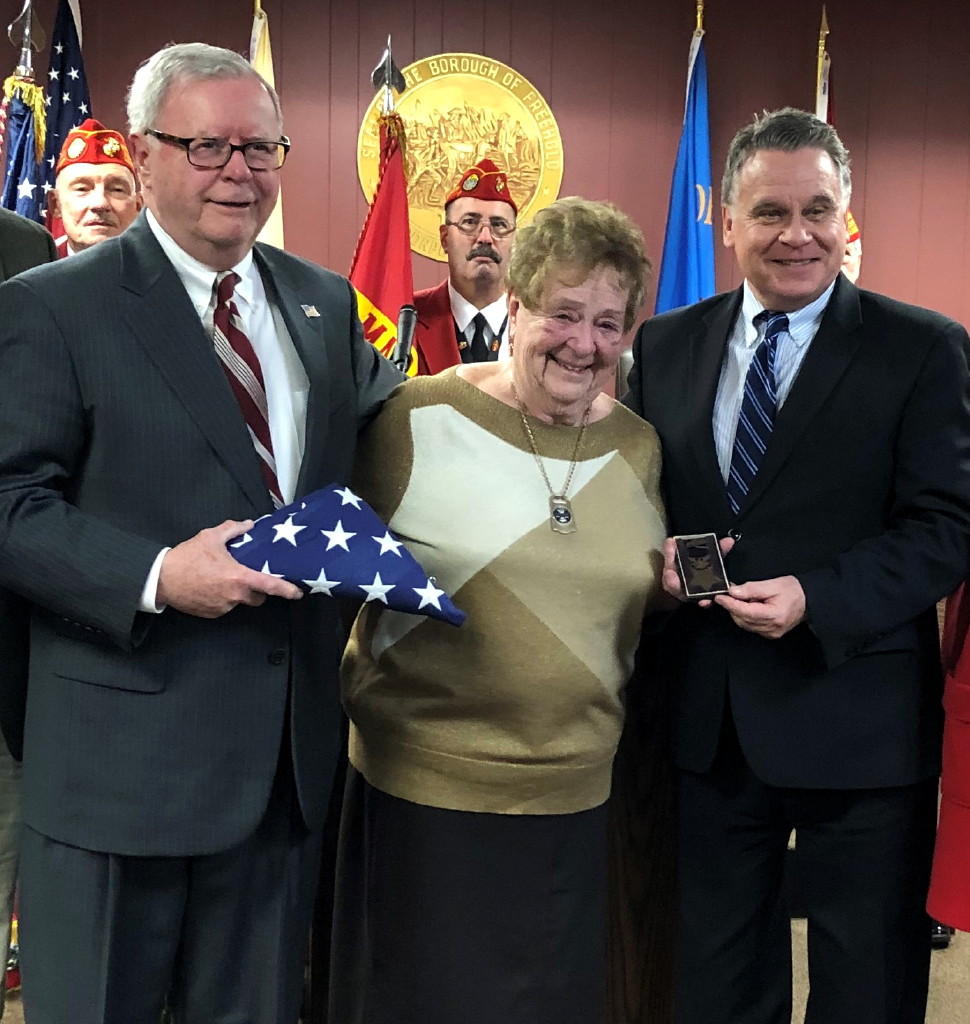#1 (left to right) Glenn Cashion, Muriel Smith (both of the Monmouth County Historical Commission, and Cashion received the medal) and Rep. Smith
#2 (left to right) Rep. Smith, Glenn Cashion, and Freehold Borough Mayor Nolan Higgins
FREEHOLD – More than 150 years after Pvt. Thomas T. Fallon’s heroic actions in the Civil War, and 128 years after he was awarded the Medal of Honor for his valor, Congressman Chris Smith (R-NJ) presented Fallon’s great nephew with the medal, returning it to the family.
“Pvt. Thomas T. Fallon received this Medal of Honor for his courage and heroism in battle and I am proud to have worked to help return this award to his descendants, as they are the rightful keepers,” Smith said. “Today we once again honor this man, and Freehold resident, who showed the highest qualities of valor while serving his country in uniform.”
On Feb. 4 in Freehold Borough, Smith presented Glenn Cashion, who conducted research and determined he was Fallon’s great-nephew, with Fallon’s Medal of Honor.
According to the congressman’s office, Smith petitioned the U.S. Army for several months and successfully persuaded the Army to release the medal after it initially denied Cashion’s request.
Present at the ceremony were Freehold Borough Mayor Nolan Higgins, Muriel Smith of the Monmouth County Historical Commission and Monmouth County Freeholder Lillian Burry.
“This distinguished honor belongs to Mr. Cashion and his entire family,” the congressman said. “They deserve to treasure the memory of their ancestor who won such great renown. Thanks to Muriel Smith and the Monmouth County Historical Commission for their diligent research on Fallon’s record in the Civil War and for tracking down the location of his Medal of Honor; thanks also to the Monmouth County Board of Freeholders and the governing body and historians of both Monmouth County and Freehold Borough for their support in this matter.”
Born in County Galway, Ireland, in 1837, Fallon emigrated to the United States in 1859 and entered service in the U.S. Army at Freehold during the Civil War. Fallon served in Company K of the 37th New York Infantry, then in the 4th U.S. Artillery Regiment, and after that as a sergeant in the 35th N.J. Infantry until July 1865.
He received the Medal of Honor in 1891 in recognition of his heroic actions at the battles of Williamsburg, Va., (May 5, 1862), Fair Oaks, Va., (May 30-31, 1862) and Big Shanty, Ga., (June 14-15, 1864), according to information provided by Smith’s office.
After Fallon’s death in 1916, the medal was returned to the federal government and eventually displayed at Dickinson College, Carlisle, Pa., before being returned to the Defense Department and stored at Fort Knox, Ky.
Cashion, of the Monmouth County Historical Commission, determined through a genealogy survey that he was the great-nephew of Fallon, and the surviving next-of-kin.
Cashion sought to obtain Fallon’s medal for the family’s keeping. He reached out to Smith, who requested that the medal be returned to Cashion as it had already been presented to Fallon.
“Enter Pvt. Fallon’s tenacious great-nephew, Glenn Cashion, the only surviving family member, who petitioned for recovery of the medal. Glenn simply wouldn’t take no for an answer.
“Muriel Smith of the Monmouth County Historical Commission asked numerous times that the medal be returned and actually went to Dickinson College, initially to no avail, but her actions proved to be essential to today’s outcome,” the congressman said.
Eventually, Army officials agreed to return the medal to the family.
“I asked, as well as Jessica Rohr of my staff, who was especially persistent. Today’s presentation honors Glenn’s great-uncle and returns the Medal of Honor to his surviving family and a county that deeply reveres his sacrifice and heroism,” Smith said.
The Medal of Honor was created in 1861 and is the highest award for valor in action against an enemy force which can be bestowed upon a member of the U.S. armed forces.

